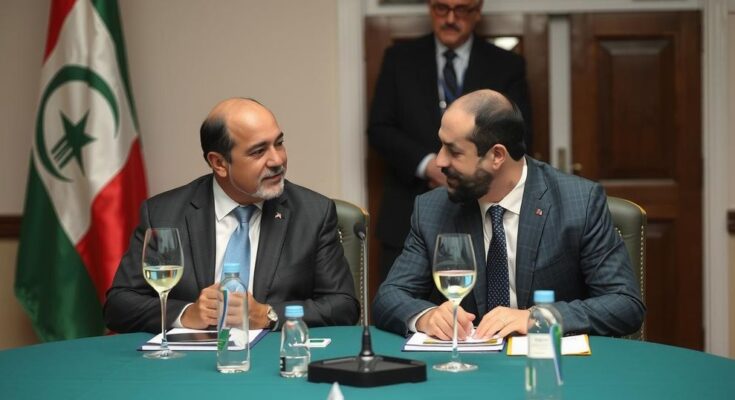A senior Libyan official met Syria’s new leader Ahmed Al-Sharaa to discuss enhancing diplomatic relations, cooperation in energy sectors, and addressing illegal immigration. Libya’s Minister stated support for Syria’s transition and indicated efforts to restore diplomatic representation, marking an important diplomatic engagement as parts of the Middle East seek to form stronger alliances post-conflict.
A senior official from Libya’s UN-recognized government engaged in discussions with Syria’s new leader, Ahmed Al-Sharaa, in Damascus on critical matters concerning bilateral relations, energy collaboration, and migration issues. Walid Ellafi, Libya’s Minister of State for Communication and Political Affairs, affirmed the Libyan government’s support for the Syrian authorities during this transitional phase. He underscored the importance of bilateral cooperation in security and military sectors, as well as in trade and energy initiatives, including addressing illegal immigration, notably of Syrians who have sought opportunities in Libya since the onset of war in 2011.
Further emphasizing diplomatic ties, Ellafi mentioned the presence of a charge d’affaires during the meeting and the ongoing efforts to appoint a permanent ambassador to Syria. The political landscape in Libya is characterized by the division of power between the internationally recognized government in Tripoli and a rival administration in the east led by military figure Khalifa Haftar. Prior to this meeting, Libya had not maintained any diplomatic representation in Damascus since the fall of Muammar Qaddafi in 2012. The meeting reflects increasing diplomatic engagement as new authorities in Damascus seek to establish relations with surrounding nations.
The meeting between Libyan officials and Syria’s new leadership comes against the backdrop of significant political shifts in both countries. Libya has been dealing with a fragmented power structure post-Qaddafi, where a UN-recognized government operates in the West while another administration, supported by Khalifa Haftar, exercises control in the East and South. Afghanistan is currently under the governance of a newly installed regime following a recent coup. Given the historical absence of Libyan representation in Damascus since 2012, this meeting signals a potential thaw in relations and diplomatic reinvigoration between the two nations. Moreover, the context of widespread migration of Syrians to Libya amidst ongoing conflict adds urgency to their discussions on illegal immigration.
The meeting between Libyan and Syrian officials marks a pivotal moment in re-establishing diplomatic ties and addressing pressing issues such as energy resources and migration. Libyan officials expressed strong support for Syria during its transition, emphasizing the need for collaborative strategies in security and military matters. This engagement may lead to improved bilateral relations and diplomatic representation, highlighting the interconnected challenges faced by both nations in the wake of enduring conflicts.
Original Source: www.arabnews.com




